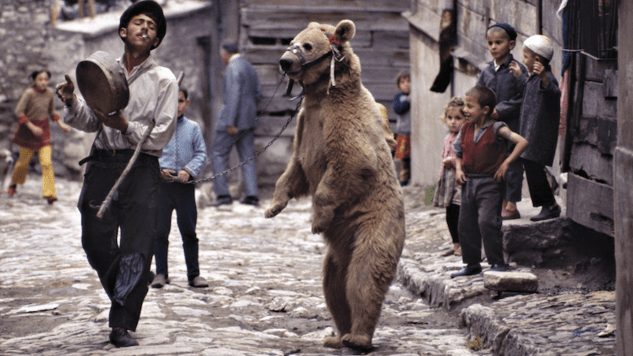Witold Szablowski’s Dancing Bears Reveals That People Are Nostalgic for Tyranny
Dancing Bears is translated by Antonia Lloyd-Jones Books Features Witold Szablowski
For centuries across Eastern Europe, enterprising Roma buskers have trained bears to dance. They’ve taken the bears from village to village, resort to resort, making them perform to the delight of tourists and their tips. To hear the Roma tell it, the bears are their livelihood, their culture, their extended family. To hear the Western World tell it, the dancing is not in response to the violin, but to pain and attempting to mitigate it as best as possible.
With the fall of Communism, the era of the dancing bears came to an end as well. By 2007, the last of the Bulgarian dancing bears had been relocated to a glorious park to learn to live with some kind of freedom.
 And they still dance.
And they still dance.
Warsaw-based journalist Witold Szablowski’s Dancing Bears: True Stories of People Nostalgic for Life Under Tyranny gives no less than half of its run to the history, relocation and cultural upheaval around the dancing bears, particularly those of Bulgaria. Szablowski then finds the bears’ counterparts in the myriad people living in the remnants—or death throes—of Communist regimes openly nostalgic for a return to their lives under the Soviet star. Along the edges of Poland and Ukraine, in the war-rent Balkans or the vintage car-choked streets of Cuba, people who feel bewildered, afraid, angry at the change in their lives—and those whom freedom left behind when capitalism moved in—desire a return to living under the monsters they knew.
What seems an impossible longing comes into cogent focus, as Szablowski transcribes their odd position. They mourn their jobs—their purpose—on the collective farms. They find themselves on the losing side of the class disparity. They see no traces of the glory and joy that is meant to accompany their freedom.
Szablowski’s dancing bears, both real and analogous, are a mere subset of those around the world, the preponderance of which represents one of our greatest threats to geopolitical stability. The victims of the past 100 years—of colonial lines and capitalist crimes—are not only nostalgic but are lashing out.
They see a world that has changed, and they wish it turned back.
Xenophobia and nationalism arise from such frustrations—the desire for banners and closed borders and old orders. In America, in Europe, in the former Soviet Union, a rising tide of reactionary anger exhibits the ugly side of change, the chaos which comes part and parcel with emancipation. The wall fell, the Communist Party’s rule replaced by criminals and capitalists, Soviet states by captured ones.
The dancing bears are beginning to bellow as they return back to blood. Freed from the cause of their suffering, but not the suffering itself, they revert to ingrained actions. They continue to dance in the face of any pain.
Whatever the bears become when the dancing finally ends will determine the new shape of our world.
B. David Zarley is a freelance journalist, essayis, and book/art critic based in Chicago. A former book critic for The Myrtle Beach Sun News, he is a contributing reporter to A Beautiful Perspective and has been seen in The Atlantic, Hazlitt, Jezebel, Chicago, Sports Illustrated, VICE Sports, Creators, Sports on Earth and New American Paintings, among numerous other publications. You can find him on Twitter or at his website.